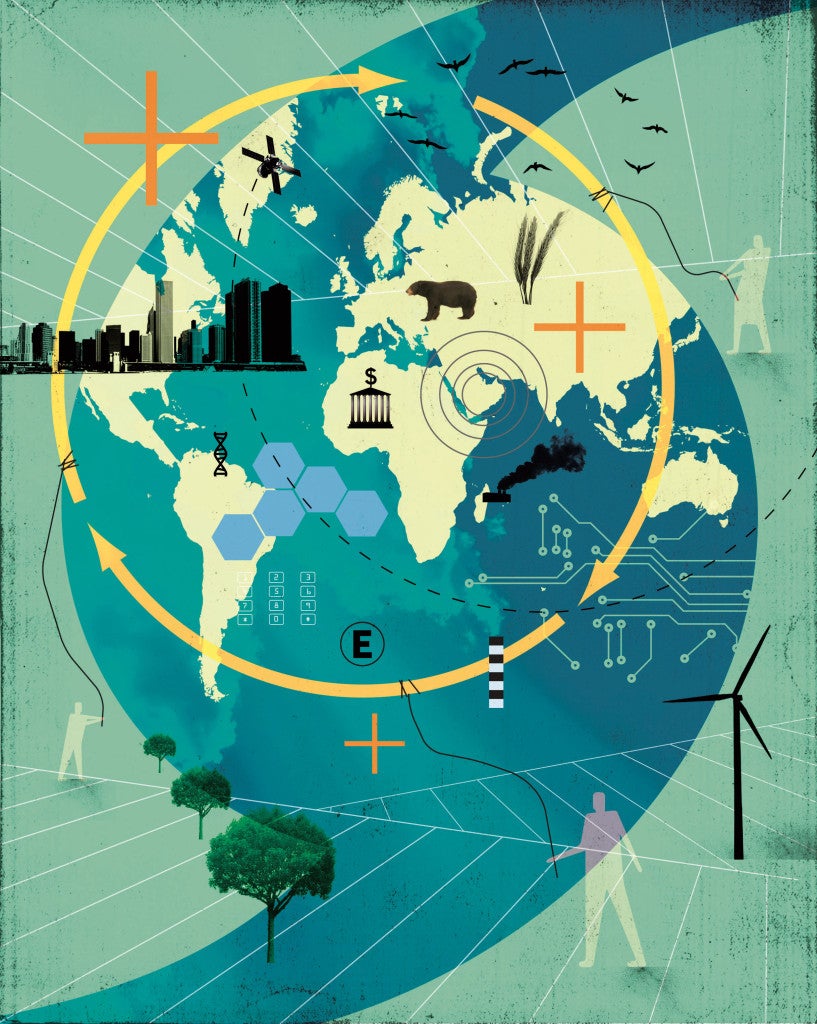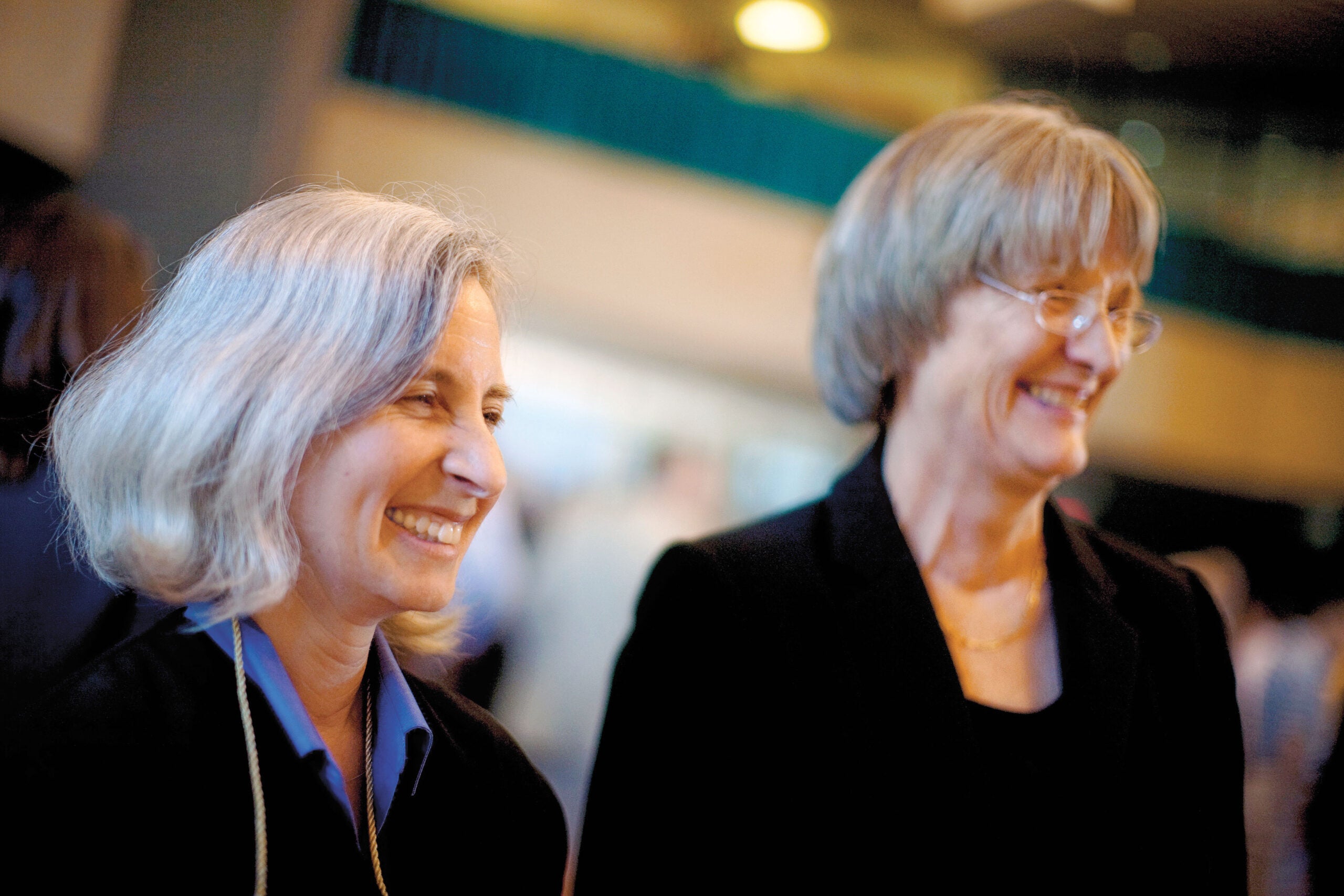“People spoke to me of her uncommon ability to bring people together for common goals”
Harvard University President Drew Gilpin Faust (above right) introducing Martha Minow (above left) as dean
Five months into her law school deanship, Martha Minow sat down for an interview, answering questions, sharing insights—and even a little advice.
Bulletin: You’ve said you believe we are at an “inflection point” in history. What do you mean by that, and how does this affect the work of lawyers?
Minow: Although historians will surely devote much ink—or bytes—to the financial crisis, I believe that this time will be known as an inflection point in world history because of huge revolutions under way in the world—changes that make this an electrifying time to be in the legal profession. Consider the information technology revolution; the biomedical revolution, including genetic breakthroughs, biotechnology and nanotechnology; globalization affecting economic exchanges of legal and professional services; and the worldwide spread of biological and computer viruses, cultural trends and more. It’s also a time of great resource scarcity, global climate change, mass population growth and migrations of people.
These shifts each day generate fundamental questions whose answers will alter the shape of the human experience. And I am certain that lawyers will play indispensable roles in tackling the issues raised by these developments and harnessing opportunities to secure orderly change and enhance human welfare. Lawyers are already working hard to address complex questions: Who owns a cell line? A double-click icon? A digitized form contract term? When should regional, domestic or international standards govern antitrust, privacy, carbon trades, disclosure of food additives, cybersecurity? What rules should govern financial morals to avoid a repeat of the subprime mortgage crisis—or the next financial crisis we have not yet identified? How can the information revolution lessen rather than exacerbate the gap between the haves and the have-nots—when, despite extraordinary world wealth, 2.8 billion people live on less than $2 a day? What mechanism should be put in place to monitor the auditor who vouches for clean energy in carbon trading markets? What, if any, rules should restrict privatizing water or other basic resources? The challenge is to develop and strengthen common values that can guide encounters and collisions between people of different religions and traditions. For example, lawyers could develop rules about borders and citizenship that promote fairness and free movement without overburdening any particular country. What could be better than to have the chance to tackle vital, hard questions like these, and make a difference in the world?
What are your main goals for Harvard Law School?

“Huge revolutions are under way in the world – changes that make this an electrifying time to be in the legal profession.”
—Martha Minow
The overarching goal is to help the remarkable community of people at the Harvard Law School join with friends across and beyond the university to pursue the promise of the rule of law, the ideal of justice, the practical solution of important problems, and ever deeper understandings of legal institutions and commitments. In these financially turbulent times, my priorities are to protect and enhance the superb opportunities available to students through classroom and clinical work, financial aid, extracurricular engagements and career advising.
We have the most extraordinary faculty, with superb appointments made over the past several years and more to come. We can and should involve students and colleagues across the university in collaborations and conversations across our wide range of views and methodologies. New technologies can transform how we teach, leverage our library resources and address topics from government censorship to digital rights. The exciting turn to problem-solving is already engaging students in identifying business and communication strategies while addressing legal, financial and emotional challenges. Continued curricular development internationalizes the basic courses and engages advanced students in transnational legal planning and analysis. Our advanced programs of study highlight pathways through school and summer opportunities and careers that recognize how law matters to science and technology, government, business, social change, and comparative and international policies. Increased opportunities to foster interdisciplinary and cross-school work provide us with a thrilling chance to help students and faculty pursue their own dreams, and tackle what justice should mean and how rules, institutions, and practices can improve human welfare.
After 28 years as a professor, what’s new to you in your job as dean?
I’ve discovered that the school has even more treasures than I knew: the nimble and effective foreclosure clinic, the amazingly talented and devoted staff members, the 16 student journals, to name just a few. I keep learning about dazzling activities and accomplishments. I am still teaching and writing, while also finding satisfaction in working with groups of people to solve problems and make and realize plans. The job change for me is in some ways like moving from involvement in the single drama of my own students and scholarship to managing a whole theater with simultaneous plays and operas under production. It’s also, though, a bit like running a city-state, with its own green policy, health policy, trade policy, and relationships with other institutions and nations.
What is your current scholarship about?
Since Brown v. Board of Education, American schools have pursued equal opportunity for students regardless of their home language, gender, immigration status, socioeconomic status, religion or sexual orientation. Yet ambivalence and debate over integration across each of these divides persist. The school choice movement—with magnets, charters and vouchers—permits increasing numbers of special-identity schools but also opportunities for integration across varied lines of student differences. Reverberations of Brown in the field of social psychology and in nations across the globe demonstrate prospects and challenges for using schools to improve social relations. I’m writing a book (“In Brown’s Wake”) for Oxford University Press that urges renewed commitment to the project of social integration even while identifying the complex routes that may achieve it.
You started a movie series at the school and are known to be passionate about film. Can movies help inform a legal education?
Films offer insight into persuasion, narrative, how to work with a found reality, how to take the perspective of other people and step into other worlds—all central to what lawyers do—even while offering rich materials to analyze and to share as a community. Just as some mayors have introduced a book for community reading and discussing, I thought sharing some films, like “Twelve Angry Men,” “Breaker Morant” and the documentary “The Reckoning,” would encourage debates and discussions even among people who don’t share classes or activities. And it’s just fun to watch and discuss films!
Your former student, President Obama, has nominated you to serve on the board of the national Legal Services Corporation. What are the challenges and opportunities there?
I am enough of a patriot to believe that it is an honor to be asked to serve my country. Indeed, in my own small way, that’s part of why I accepted President Drew Faust’s invitation to serve as dean here. My goal is to do what I can to lead at a time when the nation and the world face so many challenges. I’m especially honored to be invited to help with legal services. I worked during college and law school in legal services, and know how the availability of legal help can spell for low-income people the difference between homelessness and having a roof over your head, violent abuse at the hands of a family member and physical safety, and frustration in the face of government bureaucracies and successful navigation to obtain a health care entitlement. The model of our own clinical programs (none of which receive federal legal services funds) shows how legal assistance can help someone start a day care center or enter the recording industry; how an entire school can become responsive to children traumatized by violence; and how an individual who risks violent oppression can obtain asylum. The national Legal Services Corporation supports local efforts that are more crucial now than ever because the financial crisis is jeopardizing housing and job opportunities as it increases the frustrations that produce family violence. At the same time I hope to help the Corporation improve in governance and leverage its resources.
You’ve been a mentor to so many students. What advice has helped you in your own career?
My mother’s basic advice is bedrock: You can’t control everything that happens to you but you can control how you respond. My father gave this advice to a law student who asked him how to appear trustworthy: He said it would help as a start to be trustworthy. My dear colleague Abe Chayes said that in scholarship, it’s less important to try to have the last word on a subject than the first word. Other good pieces of advice: remember common sense, adhere to moral aspirations, and if someone asks you to do something you think is wrong, don’t do it! And several people have wisely counseled: If you are lucky enough to pursue your passions, do that, while remaining open to discovering new ones.
